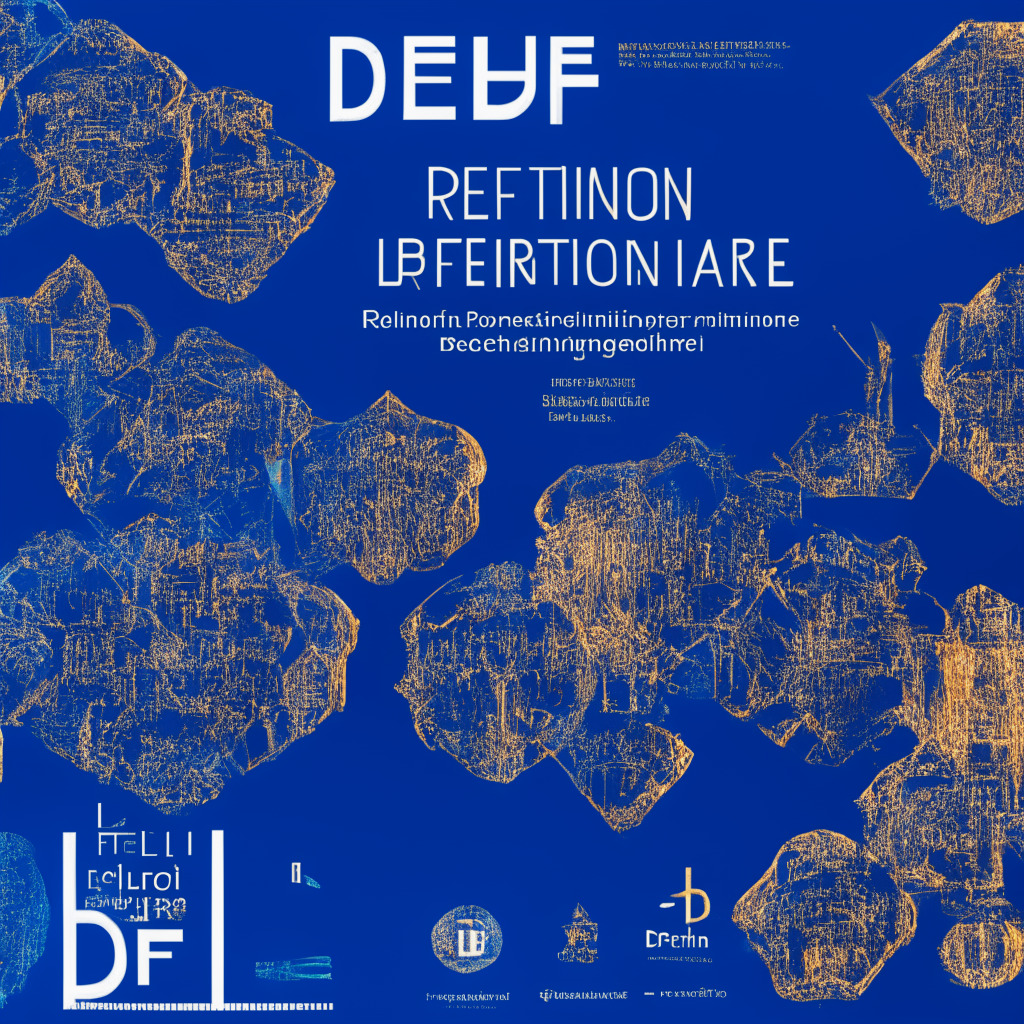CoinShares, a popular crypto asset manager, is expanding its market to the US, focusing on cryptocurrency investors with private investment products. Despite possible legal and regulatory challenges, CoinShares is optimistic about navigating the US crypto climate. Its new venture offers a hedge against interest rate-driven volatility in the crypto market.
Search Results for: European Crypto Initiative
Navigating the Storm: EU’s MiCA and the Future of Stablecoins in Europe
“The European Union’s upcoming Markets in Crypto Assets (MiCA) regulation has raised concerns about the potential delisting of all stablecoins in Europe by June 30. MiCA aims to streamline processes and enhance oversight. However, its provisions concerning stablecoins are causing apprehension, especially as they seem to contradict the aspirations of many issuers for decentralization.”
Binance’s Stablecoin Delisting: A Regulatory Avalanche or Necessary Compliance Step?
“Binance plans to delist all stablecoins from its European platform by June 2024, complying with Europe’s tight regulation. The move, following the passing of Europe’s crypto regulation law, MiCA, could significantly impact the European crypto market. Meanwhile, the U.S. grapples with its digital currency dilemma, revealing distinct attitudes towards financial digitization.”
Coinbase CEO Confirms Lightning Network Integration: A Strategic Move to Enhance Transaction Efficiency
Coinbase CEO, Brian Armstrong, recently announced the firm’s plan to bring the Bitcoin Lightning Network into its operations. This second-layer solution improves transaction speeds, enabling competition with more efficient solutions. Coinbase’s move is expected to give them a competitive advantage in the increasing crypto market competition.
Coinbase’s Global Game Plan: Tapping into Foreign Markets Despite US Regulatory Tensions
Coinbase, a global digital asset exchange, plans to expand its operations into Canada, the UK, Australia, Brazil, Singapore, and the European Union, prioritizing these markets due to more progressive digital asset regulations. This decision came after acknowledging restrictive regulations in the US market as a significant impediment. Key strategies for expansion include partnering with banks, payment service providers, and increasing local community engagement.
Unveiling the Digital Euro: Europe’s Step Towards CBDCs and What It Means For You
ECB executive Fabio Panetta recently detailed the European Commission’s plans for a digital Euro, asserting this could establish Europe as a leader in central bank digital currencies (CBDCs). The mission focuses on safeguarding European monetary sovereignty, preserving fiscal freedom, and ensuring privacy and data security. However, concerns remain over the compatibility of a digital Euro with existing financial structures.
Navigating the Web3 Era: Exploring the Potential and Pitfalls of NFTs in Various Sectors
“Adidas has launched a digital artist-in-residency program in its Web3-based Triple Stripes Studio promoting creative talent within the NFT sphere. However, with the potential risks associated with Web3 and NFTs, volatility and speculation, thorough research and cautious participation are advised.”
Lufthansa Banks on Blockchain: Navigating the Ups and Downs of NFT Loyalty Programs
Lufthansa, a major European airline, has launched an NFT loyalty program on the Polygon Network. It enables passengers to turn their travels into valuable NFTs via their Uptrip mobile app, potentially earning them rewards such as miles or business lounge vouchers.
Binance And its Formula 1 Collaboration: A High-Speed Chase Towards Mainstream Relevance & Regulatory Challenges
“Binance, in collaboration with racing driver Pierre Gasly, is hosting an art competition, where the winner’s design will feature on Gasly’s helmet during the 2023 Abu Dhabi Formula 1 Grand Prix. This initiative encourages creative engagement and community interaction among Binance users and F1 fans alike.”
Decoding RECs: Jacobi’s Green Solution to Bitcoin’s Energy Issues and the Regulatory Hurdles
Jacobi Asset Management’s new initiative involves decarbonization achieved through investments in Renewable Energy Certificates (RECs). Through this, Jacobi aims to account for Bitcoin’s carbon footprint in their ETF. However, despite success in Europe, stricter regulation in the US provides notable hurdles for such climate-friendly investments.
Navigating Regulatory Hurdles: Binance Continues Belgian Operations via Poland Amid EU Changes
Binance will continue serving Belgian users despite previous AML and CFT violations by transferring operations to its Polish entity, Binance Poland. Belgian users will now adhere to Poland’s KYC regulations. This comes amid upcoming EU crypto regulations in 2024.
Navigating Rough Waters: Binance’s New Compliance Leadership Amid Regulatory Challenges
“Binance announced that Kristen Hecht assumed the role of Deputy Chief Compliance Officer amidst potential fraud charges. Her responsibilities include strengthening compliance provisions, combating financial crime risks and overseeing anti-money laundering teams. This occurs as Binance navigates through regulatory scrutiny in the US and Europe.”
Israel’s Examination of DAOs: Democratizing Decision-Making and Dissecting Risks
The Israeli government has created a team to examine the world of decentralized governance organizations (DAOs). Comprised of high-ranking officials, the team will explore the potential uses, activities enabled, and decision-making processes inherent to DAOs, as well as the risks associated with their use of native crypto tokens. Through an open dialogue with the public and innovators in the space, this initiative aims to provide regulatory clarity in the crypto industry, a prized goal within the sector.
Decoding French Central Bank’s Wholesale Digital Currency: An Overview and the Environmental Paradox
The French Central Bank highlights the potential of a wholesale central bank digital currency (wCBDC) to improve the safety, settlement certainty, and efficiency of cross-border transactions. It reports successful tests of wCBDC paradigms based on distributed ledger technology (DLT) and foresees benefits for native digital and tokenized assets. The bank also emphasizes the need for energy-efficient solutions amidst global sustainability concerns.
Navigating the Regulatory Terrain for Stablecoins: Promising Future vs. Consumer Safety Debate
“The European Banking Authority is urging an early adaptation of guidelines for managing stablecoins, ahead of mandatory regulations due next year. This includes understanding and implementing the EU-approved MiCAR framework’s measures for good governance and consumer protection. These preemptive actions are designed to reduce potential risks and facilitate effective consumer protection in the rapidly evolving stablecoin market.”
Navigating Metaverse Regulation: EU’s Plan for Balance, Openness and Growth
“The EU is considering regulation to empower future metaverse innovation, insisting on international governance and interoperability. The plan may include creation of decentralized autonomous organizations to oversee metaverse activities, protection of personal data, and the launching of a Virtual World ToolBox in Q1 2024.”
Globally Coordinated DeFi Regulation: Balancing Innovation and Investor Protection
France’s top markets regulator, the Autorité des Marchés Financiers (AMF), calls for a globally coordinated approach to decentralized finance (DeFi) regulation, aiming to protect investors and foster innovation. The AMF highlights the challenges in categorizing and regulating DeFi protocols, emphasizing the need for consistency and uniformity in regulations across borders. A globally coordinated approach could potentially shape the DeFi industry’s future, ensuring a level playing field while promoting innovation and investor protection.
Blockchain Forever Changes Cross-Border Credential Verification: EU’s Bold Move & Privacy Concerns
The European Commission is collaborating with blockchain provider Protokol on the EBSI Vector project, aiming to simplify cross-border verification of educational and professional credentials. The forthcoming blockchain-based solution promises a secure, decentralized digital infrastructure, incorporating EU initiatives like EUeID. However, maintaining a balance between innovation and regulation is crucial to prevent misuse and protect user privacy.
Luxembourg Pioneers Web3 Regulation: Balancing Blockchain Innovation and Market Competition
Luxemburg’s competition regulator, Autorité de la Concurrence, initiates a first-of-its-kind study to explore the relationship between blockchain-based products, services, and existing digital companies. The study aims to ensure competitive and well-functioning markets, assess competition, and identify potential anti-competitive practices within Web3 and blockchain-based firms.
Bank of Japan’s CBDC Pilot: Global Trends and Privacy Concerns Clash
The Bank of Japan’s CBDC initiative report reveals 11 countries have introduced a central bank digital currency, while 18 others are in the pilot stages. Amid growing global interest, concerns about privacy and regulatory challenges persist as nations explore CBDCs’ potential in the future of finance.
Canton Network: Revolutionizing Markets or Struggling with Decentralization, Privacy, and Control
Canton Network, a privacy-enabled interoperable blockchain, aims to streamline financial markets by creating a “network of networks” for asset synchronization. With support from Microsoft, Capgemini, Deloitte and others, it seeks to balance decentralization, privacy, and control for widespread adoption by financial institutions.
Europe’s First Compliant DeFi Bank and Stablecoin: Unstoppable Finance Embraces MiCA Rules
Berlin-based fintech startup Unstoppable Finance is preparing to launch Europe’s first compliant “DeFi-native bank” and a fiat-backed Euro-pegged stablecoin in line with the European Union’s MiCA guidelines. The team previously established Germany’s first regulated crypto exchange and founded Unstoppable Finance in 2021, known for its Ultimate DeFi wallet.





















